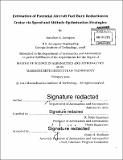Estimation of potential aircraft fuel burn reduction in cruise via speed and altitude optimization strategies
Author(s)
Lovegren, Jonathan A. (Jonathan Anders)
DownloadFull printable version (11.40Mb)
Other Contributors
Massachusetts Institute of Technology. Department of Aeronautics and Astronautics.
Advisor
R. John Hansman.
Terms of use
Metadata
Show full item recordAbstract
Environmental performance has become a dominant theme in all transportation sectors. As scientific evidence for global climate change mounts, social and political pressure to reduce fuel burn and C0 2 emissions has increased accordingly, especially in the rapidly growing aviation industry. Operational improvements offer the ability to increase the performance of any aircraft immediately, by simply changing how the aircraft is flown. Cruise phase represents the largest portion of flight, and correspondingly the largest opportunity for fuel burn reduction. This research focuses on the potential efficiency benefits that can be achieved by improving the cruise speed and altitude profiles operated by flights today. Speed and altitude are closely linked with aircraft performance, so optimizing these profiles offers significant fuel burn savings. Unlike lateral route optimization, which simply attempts to minimize the distance flown, speed and altitude changes promise to increase the efficiency of aircraft throughout the entire flight. Flight data was collected for 257 flights during one day of domestic US operations. A process was developed to calculate the cruise fuel burn of each selected flight, based on aircraft performance data obtained from Piano-X and atmospheric data from. NOAA. Improved speed and altitude profiles were then generated for each flight, representing various levels of optimization. Optimal cruise climbs and step climbs of 1,000 and 2,000 ft were analyzed, along with optimal and LRC speed profiles. Results showed that a maximum fuel burn reduction of 3.5% is possible in cruise given complete altitude and speed optimization; this represents 2.6% fuel reduction system-wide, corresponding to 300 billion gallons of jet fuel and 3.2 million tons of CO₂ saved annually. Flights showed a larger potential to improve speed performance, with nearly 2.4% savings possible from speed optimization compared to 1.5% for altitude optimization. Few barriers exist to some of the strategies such as step climbs and lower speeds, making them attractive in the near term. As barriers are minimized, speed and altitude trajectory enhancements promise to improve the environmental performance of the aviation industry with relative ease.
Description
Thesis: S.M., Massachusetts Institute of Technology, Department of Aeronautics and Astronautics, 2011. Cataloged from PDF version of thesis. Includes bibliographical references (page 96).
Date issued
2011Department
Massachusetts Institute of Technology. Department of Aeronautics and AstronauticsPublisher
Massachusetts Institute of Technology
Keywords
Aeronautics and Astronautics.